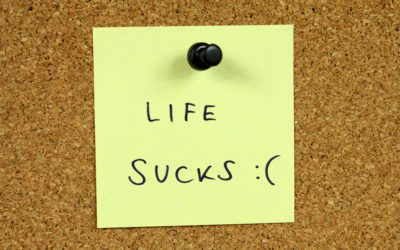When I talk with people about my seven year battle with suicidal depression nearly three decades ago, I often describe it like this:
“It was the best thing that ever happened to me, and I wouldn’t wish it on my worst enemy.”
It doesn’t feel right to call it “a gift”, because I would never purposefully give it to my children or anyone else I cared about, and yet I am incredibly grateful for what I’ve learned, who I’ve become, and who I’ve been able to help at least partially because I went through it.
From time to time, I’ll share this point of view with someone who responds by telling me they feel exactly the same way about the end of a relationship, being diagnosed with an extreme illness, losing a loved one, bankruptcy, or some other life circumstance that feels like hell while you’re going through it but reveals an almost otherworldly strength, capacity, and resilience that stays with you when you come out the other side.
In the same way, I have found there are some truths about the human experience that sound like terrible news when you first hear them (to the point where you might have a knee-jerk reaction against them), but in fact turn out to be the most wonderful things imaginable…
The first piece of good news (that sounds like bad news):
We’re not in control of our thoughts and feelings
My brother and I lost touch for a number of years when we were younger. There wasn’t any family feud or personal issue between us – it’s just that as we grew up and life took me to London and him to the Silicon Valley, we didn’t see each other very often.
When we reconnected at my father’s funeral, we were both surprised how much overlap there had been in our very separate lives, including a fascination with how the mind works (his thesis at MIT was called “On Making Sense of Making Sense”) and personal struggles with our own psychology.
What was particularly interesting to me at the time was that we’d come to diametrically opposed conclusions. While I was busy learning a host of techniques to control my thoughts and feelings, he had found peace of mind through seeing that our emotional experience was like the weather – changeable, at times seemingly random, and thoroughly outside of our control.
This sounded like terrible news to me, so much so that I wouldn’t even consider it, thinking to myself that I was glad it comforted my brother but fortunately I wasn’t so naïve as to believe it myself. I went on to become a master trainer of Neuro-Linguistic Programming (NLP), teaching people around the world to “master their emotions” by reprogramming their brains.
It was nearly fifteen years later that I had a life-changing insight into the nature of wellbeing when I heard a teacher named Syd Banks say “Every human being is sitting in the middle of mental health – they just don’t know it.” In that moment, I somehow knew that it was not only 100% true, it was true 100% of the time for everyone, including me.
My life began to change immediately, as I realized my innate wellbeing was not only not dependent on circumstances but was there even while my thoughts and feelings too me up and down the mood elevator on a regular basis. I went from being a “high-functioning depressive” to a genuinely happy person in a matter of weeks.
Here’s how I wrote about it in The Space Within:
Imagine that you are riding on a giant barge floating gently down a beautiful river. In the very center of the barge is a giant roller coaster, and your seat for the journey is in the front car. As the river carries the barge downstream, the roller coaster goes up and down, pausing every now and again before climbing its way to the next peak or plunging its way down into a valley. At times it spins wildly, completely disorienting you; at other times, you find yourself resting in the pause between rides.
Now imagine that your whole life you have ridden with your eyes closed, believing that the roller coaster is the world and the river only a myth. What would happen the first time you opened your eyes and kept them open for every moment of the ride?
At first, you might be a bit disoriented and even frightened as you watched yourself and others going up and down and around and around at occasionally dizzying speeds. The first time you crested the heights of the coaster and saw the river clearly in all its glory, you would be so taken by the view that you would never want it to end. And when your revelation was followed by a plunge to the bottom, it might seem that all was lost.
But over time, you would begin to relax into the ride, spending less and less time trying to manage the ups and downs and more and more time enjoying the views along the way. You’d take comfort in the fact that no matter what was going on with the roller coaster, the river was always effortlessly supporting the barge along its journey. And you might even begin to enjoy pondering the mysteries of where the river came from, how you came to be on it, and where it might be taking you…
In short, I came to see that my brother was right and I was wrong, not once but twice. Not only was I not in control of my thoughts and feelings beyond my occasional ability to deliberately think myself into a more positive state of mind, but this lack of control was the best news in the world.
Since I didn’t really control my thoughts and feelings (after all, did you deliberately choose what you’re thinking and feeling right now?), I could let go of the daily doses of “behavioral Prozac” (meditation, journaling, positive thinking, affirmations, etc.) that filled up hours of my day and most of my mental bandwidth. Better still, since my fundamental ok-ness (innate wellbeing) was never up for grabs, I didn’t need to work so hard to protect it.
I found myself with so much free time that for a while I didn’t know what to do with it, becoming a master at Angry Birds and wondering what was missing in my life. When it turned out that all that was missing was the background sense of fear and insecurity that had long been my “unhealthy normal”, I became startlingly productive and noticed my impact with others began to go through the roof.
In next week’s installment, I’ll share another piece of good news (that sounds like bad news), but for now, consider this:
If you knew that we don’t control our thoughts and feelings and that you didn’t have to do ANYTHING to manage your state of mind, what would you do with all that spare time?Click To TweetI’ll be back with part two next week!
With all my love,
![]()










